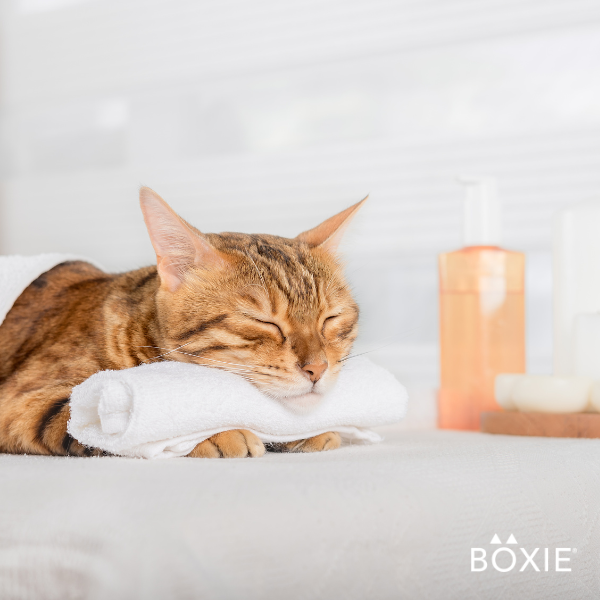7 Ways to Calm Your Cat Down

Whether it’s fireworks (4th of July), thunderstorm, a move to a new home, a trip to the vet, or just unfamiliar guests in the house, life sometimes gets overwhelming for cats. Small changes can cause big stress. Luckily, there are gentle and effective ways to help your kitty feel secure and relaxed.
Here are seven calming tips that work year-round to help your cat stay chill, no matter what life throws their way.
1. Create a Safe Haven
Cats need a space they can escape to when they’re overwhelmed. Set up a “safe zone” in a quiet room with:
-
A soft bed or blanket
-
Toys and scratching posts
-
Fresh water and a clean litter box
-
Minimal foot traffic
TIP: Try a calming cat litter like Boxie® Glo™ Natural Attractions Cat Litter.
2. Keep a Consistent Routine
Cats thrive on a consistent routine. Feed your cat at the same time each day, keep their litter box in a consistent place, and maintain a regular playtime. This helps lower anxiety and builds trust in their environment.
3. Use Calming Pheromones
Feline pheromone products like Feliway mimic the natural “happy messages” cats leave behind when they feel safe. They come in diffusers, sprays, and even collars. These products can be especially helpful during stressful events like travel, house guests, or renovations.
4. Provide Vertical Space and Hiding Spots
Cats often feel safer when they can perch above the action or retreat somewhere enclosed. Offer vertical space like cat trees or shelves, and cozy hideouts like covered beds, boxes, or even a blanket draped over a chair.
5. Play Is Natural Stress Relief
Regular play sessions are one of the best ways to reduce stress and release nervous energy. Use toys that mimic prey (like feather wands or laser pointers) and give your cat daily opportunities to pounce, chase, and "catch."
Bonus: End each play session with a treat or a meal to mimic a natural hunt-eat-sleep cycle.
6. Keep the Environment Enriching but Not Overstimulating
A calm cat is a mentally stimulated cat—not a bored or overstimulated one. Try:
-
Window perches for birdwatching
-
Puzzle feeders
-
Quiet interactive toys
-
Soft music or nature sounds
-
Scratchers (Check out our blog post here for some scratching post recommendations)
Avoid overstimulation like rough play, loud music, or constantly moving furniture.
7. Talk to Your Vet if Anxiety Persists
If your cat shows ongoing signs of stress such as hiding excessively, overgrooming, aggression, or refusing to eat, it’s time to check in with your veterinarian. They can rule out medical causes and suggest behavior plans or short-term calming aids if needed.
Check out our blog here on how to keep your cat happy.
- Tags: Fur Family Fun



